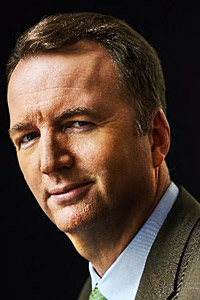
To hear it from Singapore, the global economy is a glass half full. The central bank's latest assessment skips some of the pessimism that's been a feature of communications this year. If this hub for trade and capital is right, then the global expansion will live to fight another day.
It's by no means a sure bet, and the city-state's officials are careful not to declare victory. They do sound less dour than recent prognostications from the Organisation for Economic Co-operation and Development, the International Monetary Fund (IMF) and European policymakers. "The risk of a sharp downturn, precipitated by financial vulnerabilities, has receded compared to earlier in the year," the Monetary Authority of Singapore (MAS) said on Friday.
Lots can still go wrong for the world economy: China, whose sub-par rebound has weighed on Asia, is still struggling. Consumer prices avoided declining again by the barest of margins, and economists predict figures this week will show the economy resumed its slowdown in the third quarter. War in the Middle East only adds to risks. Scenarios in which a wider conflict snuffs out growth got some oxygen at the annual meetings of the IMF and World Bank in Morocco last week.
After a strong recovery from the pandemic, Singapore entered 2023 fearing a pronounced downdraft. The island's economy shrank in the first quarter, and leaders warned of tough times ahead. Inflation was too high everywhere, with the exception of China, and interest rates were being raised aggressively. Singapore was itself an early mover, tightening policy well before the Federal Reserve and the European Central Bank. The feared recession hasn't happened.
The MAS is now solidly in the extended pause camp. It kept policy steady in its six-monthly review. More significant was its outlook. Not bullish, by any stretch, but brighter than its prior view. Inflation is retreating, albeit gradually. The electronics cycle, so critical to Southeast Asia, is poised for better days. The Bank of Korea agrees: Governor Rhee Chang-yong told CNBC last week that recovering semiconductor prices are "very good news". Hours earlier, Samsung Electronics Co reported a more modest slide in profit after scaling back losses in its chip division. Like the MAS, the BOK was early to spot inflation gathering in 2021.
In the MAS stance, there was an echo of Fed Chair Jerome Powell's declared intent to "proceed carefully". Also embracing a breather, with reservations, are authorities in Australia, New Zealand, Indonesia, Malaysia and Thailand. As with the Fed, the MAS is pretty much done with tightening. There's also little suggestion that an easing is on the horizon. If MAS does reverse course, it will be because the global picture has deteriorated. The first opportunity will come in January; the bank announced that it will review its position every three months, up from the long-standing practice of scrutinising policy twice a year.
Singapore's domestic economy looks pretty solid. Gross domestic product increased 1% in July-to-September, much more than forecast and up from 0.1% in the prior quarter. Core inflation eased to 3.4% in August, down from a peak of 5.5% in January. Not that Singapore is remotely cheap. Scars linger from huge increases in rent, and the price the government charges merely for the right to buy a car remains hefty. Even the country's beloved chicken rice dish is becoming dearer.
That a small country so intimately tied to the rhythms of global commerce has dodged a slump counts for something. Singapore's reading of the terrain contains some comfort for optimists. Just don't say it too loudly. ©2023 Bloomberg
Daniel Moss is a Bloomberg Opinion columnist covering Asian economies. Previously, he was executive editor for economics at Bloomberg News.
